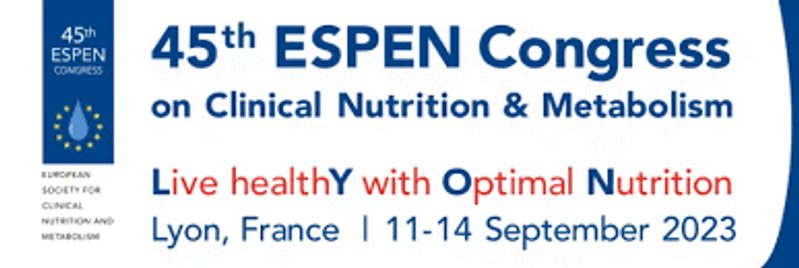
Posted on: September 22, 2023
This September, a global clinical nutrition network from across 103 countries came together to promote best nutritional care for patients across the world. The 45th congress of the European Society for Clinical Nutrition and Metabolism (ESPEN) took place in the beautiful city of Lyon on 11-14 September, with a focus on Living healthY with Optimal Nutrition. It was an event for exchange, networking and celebration of the pioneering work of the scientific field of nutrition throughout the year.
The opening ceremony treated participants to a journey from gastronomy to nutritional health. Lyon has long been known as ‘The Gastronomic Capital of the World;’ home to numerous Michelin-starred restaurants and renowned for its food culture. Lyon is also the birthplace of many French culinary traditions and was base for the pioneering chef Paul Bocuse, acclaimed for his innovative approaches to cuisine. The session saw nutrition researchers from Institut Lyfe (formerly institute Paul Bocuse) cover five principles of gastronomy for improving pleasure and nutrition and demonstrating their research into improving hospital malnutrition. Michelin Guide then introduced their new Green Star; a 2021 initiative promoting chefs who have taken responsibility by preserving resources and embracing biodiversity, reducing waste and reducing the consumption of non-renewable energy. From sustainable cuisine and gastronomy initiatives to nutritional health and patient care, the audience was given plenty to digest!
ESPEN guidelines are recognised worldwide as important guidance from experts across the world to promote the best clinical care across the globe, so the annual ‘Meet the Guideline Experts’ session proved a popular lecture. The experts are working through a list of ESPEN practical guidelines that are being condensed into concise, app and web-based guidance to enhance accessibility and user ease. Of note was the ESPEN Chronic Intestinal Failure in Adults 2023 update that covered the transition from paediatrics to adult centres and included new chapters on cost effectiveness; including data on how early initiation of clinical therapy impacts patient outcomes.
The organisers also built on the success of previous years’ virtual events, increasing accessibility and eliminating geographical barriers by adopting a hybrid approach to the event, with many delegates accessing the lectures virtually.
ESPEN 2023 was a great example of education and industry partnership with the nutrition companies displaying a phenomenal exhibition hall and organising inspiring satellite symposia. Delegates who wanted to maximise their opportunity for education saw leading experts in the field discuss important and evolving concepts that support clinical practice.
A series of poster tours took place throughout the three days to acknowledge and recognise all the hard work and research in the field of nutrition and metabolism.
Highlights of the congress include a ‘Fireside Patient Chat’ with Dr Simon Gabe from St Marks Specialist Intestinal Failure unit and his patient. It was truly wonderful to see how 25 years of research translates into a new life for an intestinal failure patient and his family. Another patient focussed session was the Royal Surrey 4 step bowel obstruction diet; a stepwise approach to blended diet that reduced the number of hospital admissions and increased patients’ quality of life; giving hope to patients that they can manage their symptoms palliatively without further surgery. And lastly, the 2023 Arvid Wretlind lecture - Intestinal Failure: the interdisciplinary care and treatment of patients with a neglected organ failure. Attendees listened to an impassioned Palle Bekker Jeppeson discuss the ATLAS Project, a vision for all patients with Intestinal Failure in Europe to receive an equal standard of care by 2030 through improvement in patient outcomes.
Amongst so much research was the notion that there is still so much we don’t know. Nutritional care should be a human right for every single human being and raising awareness is key to bringing nutrition to the forefront of our attention.
BSNA members provide a lifeline to patients with medical nutritional requirements but there is so much more to be done. ESPEN offered the perfect opportunity for dietitians, pharmacists, nurses, physicians, nutritionists, scientists, and everyone involved in the field of nutrition and metabolism to gather together and raise important questions. We hope this discussion continues to stimulate new collaborations and consolidate the ever-growing knowledge within the field. Advancing our curiosity and advancing nutritional care.